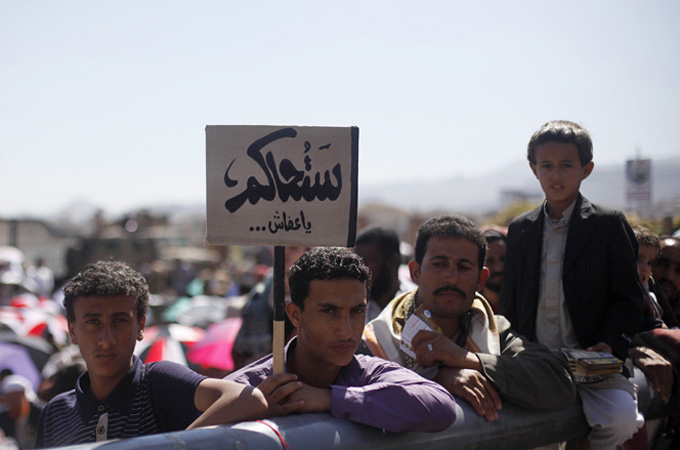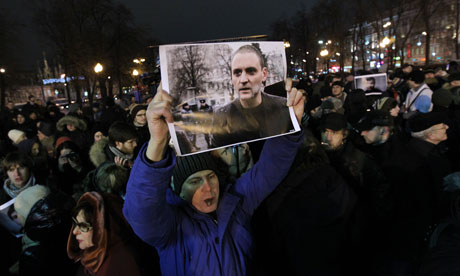By Zach Waksman
Impunity Watch Reporter, Africa
ABUJA, Nigeria – President Goodluck Jonathan of Nigeria declared a state of emergency in 15 Local Government Areas (LGAs) located in the Borno, Yobe, Plateau, and Niger states on Saturday. The announcement comes less than a week after a series of Christmas Day bombings by the radical Islamist sect Boko Haram rocked the country and killed at least 42 people.

The recent round of attacks by Boko Haram was a break from its previous focus government and military targets. This time, the organization, who took credit for the bombings, destroyed several churches, including one in a suburb of Abuja, the capital, where at least 25 worshipers died. The campaign is considered to be an effort to exploit long-lasting strife between Christians and Muslims. Though Nigeria has an approximately even split between the two religions, it is not a homogeneous population, with a largely Muslim north and a heavily Christian south. Boko Haram, whose name roughly translates as “Western education forbidden,” seeks to impose strict Islamic law throughout the country.
“This is a sign that they’ve decided to try to ignite the Muslim-Christian fault line,” said Darren Kew, a Nigeria expert at the University of Massachusetts-Boston. “They are trying to expand from their roots,” he said, adding that until now, the group had “largely avoided antagonizing the Christians. This is a strategic choice on their part to broaden their offensive.”
In a nationally televised address, President Jonathan announced that Nigeria would be closing its borders with Chad, Cameroon, and Niger in order to control activities outside the country. He also said that he instructed the Chief of Defence Staff to set up a counterterrorism unit as part of his promise to defeat Boko Haram, which he declared to have “grown cancerous” and therefore needed be removed from Nigeria.
“We will crush the terrorists,” Jonathan said. “If there are institutions…which are harbouring terrorists, we will deal with them.”
The announcement has received mixed reactions within the country. He received praise from several groups for showing initiative and finally taking a necessary step. Those organizations, along with leaders in the four states the declaration affects, have pledged to support him in his new efforts, despite acknowledging that success would not be easy.
In an interview with the News Agency of Nigeria, Arewa Youth Consultative Forum (AYCF) President Alhaji Yerimma Shetima said that “Jonathan did well as the number one citizen, and must stand his ground on the issue. The president has our support and should continue to declare emergencies in any part of the country where the nation’s security is threatened, until terrorism is uprooted from Nigeria.”
Others have not been so charitable. The Action Congress of Nigeria (ACN) said that it would accept “whatever reasonable measures” were taken to protect the country and prevent needless loss of life. At the same time, it expressed concern with whether any action would be of great help, saying that “a State of Emergency can only address the symptoms rather than the root causes of the current security crisis facing the nation.”
House Deputy Minority Leader Suleiman Kawu Sumaila went even further. He considered the developing crisis proof that Jonathan was unfit to lead Nigeria. But Sumaila did not consider calling for the President’s removal from office.
“We are waiting for him to furnish us with the details and content or the way the emergency will be shaped,” Sumaila said. “But, we will support everything possible to bring an end to this national tragedy.”
Jonathan’s declaration reached out all leaders, political and civilian, who had been working to maintain peace following attacks. He extended their efforts to his own vow to defeat Boko Haram.
“Terrorism is a war against all of us. I call on all Nigerians to join hands with government to fight these terrorists,” he said.
For more information, please see:
Guardian — Emergency Rule in Four States Divides Citizens — 02 January 2012
Nigerian Tribune — Emergency Rule: Jonathan Receives Knocks, Kudos — 02 January 2012
BBC — Boko Haram Attacks Prompt Nigeria State of Emergency — 01 January 2012
Nigerian Tribune — Boko Haram: Jonathan Declares State of Emergency in 15 LGAs; Closes State Borders — 01 January 2012
Times of Nigeria — Jonathan Declares State of Emergency in Borno, Yobe, Plateau, and Niger — 31 December 2011
New York Times — Nigerian Group Escalates Violence with Church Attacks — 25 December 2011



